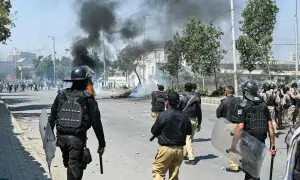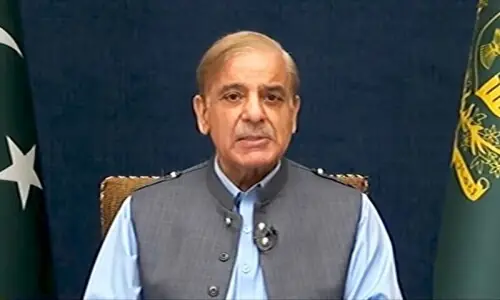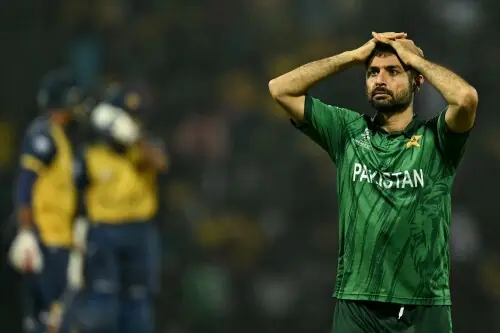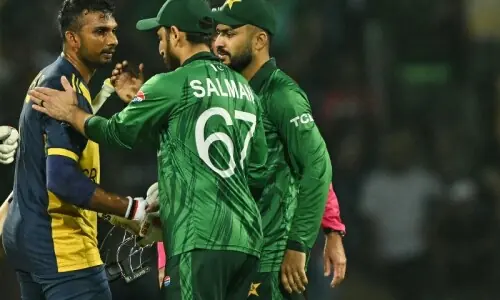BANGLADESH is again plunging itself into another phase of political turmoil and violence.
The decision by the Dhaka-based International Criminal Tribunal (ICT) to award capital punishment to two key leaders of the Bangladeshi Jamaat-i-Islami (JI) on charges of war crimes during the March-December 1971 civil war in the former East Pakistan has triggered large-scale violent protests and clashes with police killing and injuring a large number of people.
It must be asked why the Awami League (AL) government of Sheikh Hasina decided to establish the ICT and try those whom it accused of “collaborating” with the Pakistan Army in the “genocide” of Bengali people during the military operation.
On Feb 28, the controversial ICT found JI vice-president and former member of parliament Delwar Hossain Sayedee guilty of murder, religious persecution and rape and sentenced him to death. The verdict triggered widespread protests in different parts of Bangladesh and also invited counter-demonstrations by those who supported the court’s verdict.
In Dhaka’s Shahbagh square, thousands of protesters demanded “exemplary punishment” for war criminals and a ban on the Jamaat. The tribunal is trying a total of nine JI leaders and two members of the opposition Bangladesh Nationalist Party (BNP) for their alleged war crimes.
AL is blamed by its opponents, including the BNP, of transforming Bangladesh into a fascist state by using excessive force against opponents, manipulating the events of 1971 for political consumption and transforming the country’s Islamic identity into a secular one.
Because of three major reasons, Bangladesh is unable to detach itself from the events of 1971. First, anti-Pakistan rhetoric has become an integral part of Bangladesh’s political discourse. It is one thing which has been used by various regimes since 1971 to remind people of the liberation war and the value of freedom. Dec 16 in Bangladesh is celebrated as Victory Day. In fact, most of the national days celebrated in Bangladesh are based on anti-Pakistan rhetoric.
Feb 21 is celebrated as Language Day to mark the struggle launched in East Pakistan to oppose the imposition of Urdu as a national language. March 26 is celebrated as Independence Day to mark the launch of the brutal military operation by the West Pakistan-dominated regime to quell the Awami League-led civil disobedience movement.
Second, some political parties, particularly the Awami League, which fought the liberation war consider it useful to exploit 1971 for political purposes. By diverting people’s attention from ‘real issues’ like corruption, nepotism and bad governance, the AL government is targeting what it calls ‘war criminals’.
Finally, the sufferings caused to the people of Bangladesh in view of the exploitative and unequal relationship with the West Pakistan-dominated regimes have nurtured anti-Pakistan feelings, which persist even after 41 years of independence from Pakistan. The military operation of 1971 alienated the Bengali population of the former eastern wing, and became the source of Bangladesh’s national identity. It is perceived that no government in Bangladesh can detach itself from the events of 1971 and the liberation struggle because the survival of that country rests predominantly on keeping these memories alive.
The BNP and other opposition parties in Bangladesh have alleged that the AL, by pursuing a policy of vendetta, wants to eliminate political opponents before the next elections, due in December 2013. By augmenting the level of political polarisation and targeting religious parties, particularly the Jamaat, Prime Minister Sheikh Hasina has caused her country to plunge into a serious crisis.
There have been reported attacks on Hindu temples and two Hindu leaders of AL were recently targeted. Islamists in Bangladesh blame India for sponsoring demonstrations supporting the ICT’s verdict against JI leaders. Furthermore, the recent killing of an anti-Islam blogger by five university students and the demand made by Islamic parties to hang other bloggers on charges of blasphemy also indicate a surge of religious extremism in Bangladesh.
Steps taken by the AL government in the last few years to reverse the process of Islamisation by military dictators, generals Ziaur Rehman and Hossein Mohammad Ershad, during the late 1970s and 1980s have also deepened the conflict between Islamists and secularists.
Putting the matter in historical perspective, in 1974, as a result of Pakistan’s recognition of Bangladesh and Sheikh Mujibur Rahman’s visit to Lahore for the Second Islamic Summit Conference in Feb 1974, Dhaka agreed not to press for the trial of 195 Pakistani prisoners of war — detained in Indian PoW camps — on charges of war crimes.
Pakistan has expressed regret to Bangladesh about the excesses committed during 1971 but has so far refused to tender a full apology. Therefore, one way to keep the issue of 1971 alive was to try the Bengali nationals, termed collaborators, who primarily belonged to the Al Badr and Al Shams wings of Jamaat-i-Islami.
One plausible way to deal with the 1971 syndrome is to start the process of reconciliation by forming an independent commission to thoroughly investigate excesses committed during the military operation of 1971 by the Pakistan Army as well as the killings of non-Bengalis in East Pakistan by armed Bengalis and the Mukti Bahini.
The proposed commission, which can be called the Bangladesh-Pakistan Truth and Reconciliation Commission, will help heal the wounds of 1971 in Bangladesh and in Pakistan and will also help improve relations between the two South Asian countries.
The writer is professor of International Relations, University of Karachi and has authored a study titled Bangladesh and Pakistan: From Conflict to Cooperation.





























